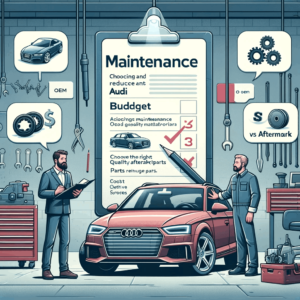Introduction
 Audi Maintenance Cost - Owning an Audi is more than just a statement of style and luxury; it's an experience that melds advanced engineering with sophisticated design. However, an integral part of this ownership experience is understanding the maintenance costs associated with these high-performance vehicles. Grasping the nuances of Audi maintenance costs is essential not only for budgeting and financial planning but also for ensuring the longevity and optimal performance of your vehicle.
Audi Maintenance Cost - Owning an Audi is more than just a statement of style and luxury; it's an experience that melds advanced engineering with sophisticated design. However, an integral part of this ownership experience is understanding the maintenance costs associated with these high-performance vehicles. Grasping the nuances of Audi maintenance costs is essential not only for budgeting and financial planning but also for ensuring the longevity and optimal performance of your vehicle.
Knowing what to expect in terms of maintenance expenses helps Audi owners make informed decisions about their vehicle's care. It's not just about addressing issues as they arise; it's about proactively managing the health of your car to avoid costly repairs down the line. In this article, we'll dive into the various aspects of Audi maintenance costs, offering insights and tips to help you navigate the world of luxury car maintenance with confidence and ease. Whether you're a long-time Audi enthusiast or a new owner, understanding these costs is key to a rewarding and hassle-free Audi ownership experience.
The Basics of Audi Maintenance
Maintaining an Audi involves essential tasks like regular oil changes, tire rotations, and brake inspections. For oil, Audi recommends synthetic changes every 10,000 miles or annually. Tire rotations, crucial for even wear, should occur every 5,000 to 10,000 miles. Brake inspections, vital for safety and performance, are advised with each oil change.
Adhering to Audi’s recommended maintenance schedule is key to preserving the vehicle's performance and longevity. This includes routine checks of the electrical system, battery, air filters, and fluid levels. Most Audi's have a Maintenance Reminder System to alert owners when service is due, ensuring your Audi remains in peak condition.
Average Costs of Routine Audi Maintenance
 The cost of maintaining an Audi can vary significantly depending on the model, age of the vehicle, and the specific maintenance tasks required. Here's a detailed breakdown to help Audi owners anticipate what they might expect to spend on routine maintenance.
The cost of maintaining an Audi can vary significantly depending on the model, age of the vehicle, and the specific maintenance tasks required. Here's a detailed breakdown to help Audi owners anticipate what they might expect to spend on routine maintenance.
Oil Changes: One of the most common maintenance tasks, an oil change for an Audi typically costs between $100 to $200. This price can vary based on the model and whether it requires synthetic oil, which most modern Audis do.
Tire Rotations: Tire rotation costs are generally more consistent across models, ranging from $25 to $50. However, if tire balancing or alignment is needed, the cost can increase.
Brake Inspections and Repairs: Brake pad replacements can range from $150 to $300 per axle, but for higher-end models or those with specialized brake systems, costs can be significantly higher.
Older vs. Newer Models: Generally, older Audi models may incur higher maintenance costs due to out-of-warranty parts and potential wear and tear. Newer models, on the other hand, often benefit from more advanced engineering and materials, potentially lowering routine maintenance costs. However, they may require more specialized services that can be costlier.
Warranty and Audi Care Packages: Audi’s warranty can cover many routine maintenance tasks for newer models, significantly reducing costs for the first few years of ownership. Audi also offers Audi Care, a prepaid maintenance plan that covers scheduled services up to 5 years or 50,000 miles, whichever comes first. This plan can be a cost-effective way to manage maintenance expenses, as it often costs less than paying for individual services.
Major Repairs and Their Costs
 Audi vehicles, while engineered for durability and performance, may occasionally require major repairs. Understanding these potential costs is vital for any Audi owner.
Audi vehicles, while engineered for durability and performance, may occasionally require major repairs. Understanding these potential costs is vital for any Audi owner.
Transmission Repairs: One of the costlier repairs for an Audi can be transmission issues. Repairing or replacing a transmission can cost anywhere from $2,000 to $5,000, depending on the model and the severity of the problem.
Engine Repairs: Engine-related repairs, such as fixing a blown head gasket or replacing timing belts, can range from $500 to over $2,000. For high-performance or older models, these costs can escalate due to complex engineering and the need for specialized parts.
Suspension Repairs: Audi's sophisticated suspension systems, crucial for their smooth ride, can be expensive to repair. Costs can vary widely but typically start around $300 and can go much higher, especially for models with adaptive or air suspension technologies.
Model and Age Impact: The cost of major repairs is significantly influenced by the model and age of the Audi. Newer models might still be covered under warranty for certain repairs, reducing out-of-pocket costs. However, high-performance or luxury models often require more expensive parts and labor. Conversely, older models, no longer under warranty, may incur higher repair costs, especially if they require hard-to-find parts or more extensive labor due to wear and tear.
Comparing Audi Maintenance Costs with Other Luxury Brands
Audi's maintenance costs are comparable to other luxury brands like BMW and Mercedes-Benz, which also demand high upkeep due to their advanced engineering and specialized parts. However, Audi often presents a more cost-effective option, especially with its Audi Care maintenance packages. In contrast, brands like Lexus, leveraging their association with Toyota, tend to have lower maintenance costs due to shared parts and a focus on reliability. The difference in maintenance expenses among these brands mainly arises from their varying engineering complexities and service requirements, with Audi striking a good balance between luxury and cost-efficiency.
Tips for Managing and Reducing Maintenance Costs
 For Audi owners looking to manage and reduce maintenance expenses, several practical strategies can be employed:
For Audi owners looking to manage and reduce maintenance expenses, several practical strategies can be employed:
- Choose Reputable Service Providers: Opt for trusted, independent mechanics who specialize in Audi or German cars. They often offer more competitive rates than dealerships without compromising on service quality.
- Aftermarket Parts: Consider using high-quality aftermarket parts for certain repairs. These parts can be significantly cheaper than OEM parts while still maintaining good performance.
- Preventive Maintenance: Regularly scheduled check-ups can prevent minor issues from becoming major, costly problems. Follow Audi’s maintenance schedule diligently.
- Stay Informed: Educate yourself about your Audi’s maintenance needs. Knowing what services are necessary and when can help you avoid unnecessary expenses.
- Warranty and Maintenance Packages: Utilize warranty for eligible repairs and consider maintenance packages like Audi Care, which can offer savings on routine service.
By taking a proactive and informed approach to Audi maintenance, owners can effectively reduce their overall expenses while maintaining their vehicle's performance and longevity.
Long-Term Maintenance Considerations
Long-term maintenance planning is crucial for Audi vehicles to ensure their performance and preserve their value. Regular and thorough maintenance extends the lifespan of the vehicle and prevents costly repairs in the future. This diligence not only enhances the driving experience but also significantly impacts the car's resale value. Well-maintained Audis are more attractive to potential buyers, often fetching higher resale prices. Additionally, consistent upkeep ensures the vehicle remains compliant with safety and emission standards. Ultimately, investing in regular maintenance is investing in the longevity and value of your Audi, ensuring it remains a symbol of luxury and reliability.
Conclusion
Understanding and managing maintenance costs is vital for Audi owners. Regular maintenance, considering aftermarket parts, and choosing reputable service providers are key strategies for cost-efficiency. Long-term maintenance planning not only ensures the vehicle's performance and safety but also enhances its resale value. Staying informed about these costs is fundamental to enjoying the luxury and reliability that come with owning an Audi.
